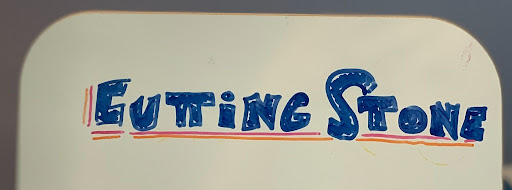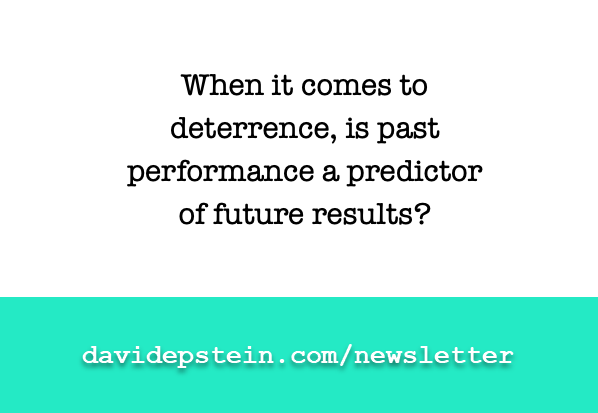
June 4, 2020
When I called my brother this week, he wanted to talk about a black man in Minneapolis who died after police officers pinned him down with their knees, for several minutes, until he stopped breathing. The man’s name: David Cornelius Smith; he died in 2010.
A decade ago, the city of Minneapolis was grappling with an event eerily similar to the recent death of George Floyd. I had never heard of David Cornelius Smith, and you probably haven’t either. But my younger taller brother, Daniel Epstein, is a 34-year-old attorney with a long-running interest in criminal (and civil) justice reform. (He recently used his life’s savings to run for Supreme Court of Illinois on a platform to reform judicial rules; in Illinois, Supreme Court justices wield significant power by setting rules for everything from bail procedures to, well, their own conflicts of interest.)
In telling me about Smith’s death, Daniel taught me a few things that I’ve been thinking about since, so I invited him to do a Q&A. Below is an edited version of our conversation. First, a quick intro to the death of David Cornelius Smith:
Smith was a 28-year-old black man who was mentally ill and experiencing homelessness. On September 9, 2010, he entered a sixth-floor basketball court at the YMCA in downtown Minneapolis, where he behaved strangely, alarming patrons and staff. Staff members called the police, who tried to talk Smith into leaving. Smith refused. Video shows that officers tased him several times. (One officer tells the other that he has never used his taser before, and asks if he should.) The officers wrestled Smith to the ground and knelt on his back, an act known as “prone restraint.” After four minutes, they realized he wasn’t breathing. The officers attempted to resuscitate Smith and called paramedics. The paramedics restarted Smith’s heart, but he was comatose and died a week later.
David: One difference between Smith’s and Floyd’s deaths is that the officers don’t appear to have been criminally charged in the first case. But something else you said about the aftermath of Smith’s death struck me — about the civil suit his family brought and how it was resolved. Can you describe what happened?
Daniel: Sure. The city of Minneapolis settled in 2013 for $3 million, and agreed to a requirement for more training on proper restraint techniques. But the officers themselves didn’t pay anything out of their own pockets, so there was no direct punishment. As an aside, Derek Chauvin, the officer who knelt on George Floyd’s neck, is a 19-year veteran, so I’d be interested to know if he got the extra training about prone restraint. And, if so, why didn’t it work?
David: That makes me think of a book I read recently, The End of Policing. The author, sociologist Alex S. Vitale — coordinator of the Policing and Social Justice Project at Brooklyn College — writes that “researchers have found no impact” of extra training. (And, by the way, the Minneapolis PD has spent millions on everything from implicit bias training to body cameras.) With regard to increasing diversity (which the Minneapolis PD also did), Vitale writes: “There is now a large body of evidence measuring whether the race of individual officers affects their use of force. Most studies show no effect.”
That book really stuck with me. When I was the overnight crime reporter at the New York Daily News, I assumed that better training and hiring more officers of color would alleviate a lot of the bad behavior. But the research that Vitale cited suggests that my assumptions were wrong.
Daniel: Yeah, I think that’s an argument for taking a closer look at the rules and incentives that influence police and policing.
David: Right. I’m reminded of the concept of “wicked learning environments,” in which individuals or organizations repeatedly fail to improve with experience because there is no system that forces them to recognize and learn from mistakes. Do you think the justice system, with respect to police misconduct, is a wicked learning environment?
Daniel: I think so. It seems like what one legal scholar calls a “recurring miss.” The system is designed in a way that allows bad behavior to go unpunished, so it repeats. The officers who killed Smith by putting sustained weight on him while in a “prone restraint” not only didn’t face criminal charges, they themselves didn’t have to pay the victim’s family.
David: From your attorney perspective, can you offer any potential solutions?
Daniel: There are a bunch, but one of the more clever accountability solutions I’ve seen proposed is to require officers to carry malpractice insurance. The idea is: in the same way that insurance promotes safer cars and safer driving through premium adjustments, it would promote safer policing. Officers with disciplinary records (Derek Chauvin had received two letters of reprimand) would be costly to insure, maybe prohibitively so. There is actually some research that has shown that, with systems like this, insurance companies put pressure on police departments to reduce the use of force and to fire bad cops.
David: That reminds me of one more quote from The End of Policing, that “use of force is highly concentrated in a small group of officers who tend to be male, young, and working in high-crime areas.” So maybe steep financial repercussions could help weed out repeat offenders. Of course, they would have to repeatedly offend in the first place, but maybe it would catch some of them before anything truly devastating happens. But financial penalties aside for a second, what about criminal penalties?
Daniel: Law enforcement officers rarely face criminal charges for use of force, and when they do, they usually win. Prosecutors have to prove that an officer acted unreasonably when viewed “from the perspective of a reasonable officer on the scene, and [that] calculus must embody an allowance for the fact that police officers are often forced to make split-second decisions about the amount of force necessary in a particular situation.” Here’s how that plays out in practice: officers testify that they feared for their lives when they saw the person they shot make a suspicious movement, and juries tend to give a lot of leeway to officers making those split-second decisions. That’s usually enough for acquittal. But these prone restraint cases have a unique feature: there is no split-second decision. The two officers who dealt with David Cornelius Smith pressed down on him for four minutes. They don’t appear to have been charged. If they had been, I wonder if it would have stuck in officer Chauvin’s mind and whether he would have been more likely to remove his knee from George Floyd’s neck.
David: Ok, so police are rarely criminally charged, and when they are, the burden of proof is extremely high. What about civil charges against individual officers, as opposed to against the city?
Daniel: Cops don’t have to worry about that. For the most part, they enjoy what’s known as “qualified immunity,” which means they’re so thoroughly protected from civil lawsuits that judges and juries don’t even get the chance to decide whether they violated someone’s constitutional rights, whether by using excessive force or in some other way.
David: I’ve heard the term qualified immunity for years, but don’t know the origins or level of protection. So what exactly is it, and why does it exist?
Daniel: You can thank the Supreme Court for qualified immunity. You won’t find it in the Constitution. The Court established the defense in 1967, and expanded it 15 years later. So if you want to sue an officer today for violating your constitutional rights, you have to show that your right was “clearly established,” which in practice means that you pretty much have to find an old case that’s almost identical to yours, and in which the victim won. Turns out that’s a tall order that leads to some bizarre results. For example, a recent lawsuit alleged that Fresno cops who executed a search warrant on a suspected illegal gambling operation pocketed $225,000 that should have gone into evidence. The 9th Circuit Court of Appeals held that the officers could not be taken to trial because they enjoyed qualified immunity and it wasn’t “clearly established” whether cops stealing property that was seized under a warrant violates the Constitution.
David: That seems very “turtles all the way down” — you can’t prove that your constitutional rights were violated unless someone else proved it in the same situation, which would have required that person to find someone else who proved it in the same situation…and so on. So did that stop David Cornelius Smith’s family members from bringing a civil suit against individual officers?
Daniel: It certainly could have. It might sound strange, but if they couldn’t find a past case that ruled that killing via prone restraint while in custody violates the Constitution, they would be in a tough spot.
David: So let’s say that was indeed the case. Will that same reasoning possibly apply in the death of George Floyd?
Daniel: Officer Chauvin and the other officers could conceivably get qualified immunity because Floyd’s family can’t point to the very similar case of David Cornelius Smith as one where constitutional rights were found to have been violated. Basically, it’s really hard to deter police misconduct by hitting cops in the pocketbook. But remember, qualified immunity only applies to civil suits, and in Floyd’s case the officers have been charged criminally. But officers have protections that you and I don’t have, and qualified immunity isn’t the only one.
David: Do tell…
Daniel: If you and I were arrested right now on suspicion that we shot someone, the cops would take us to separate rooms and interrogate us immediately. They wouldn’t tell us what they actually know, and they might lie to us about what they know, which is allowed in a lot of jurisdictions. But now let’s say that you and I are police officers and we’re being investigated for disciplinary purposes after we shot someone — totally different procedure. In many cities, because of collective bargaining agreements negotiated by a police union, there’s a buffer period of a day or a few days during which time officers David and Daniel cannot be interrogated. When the buffer period is over, you and I will learn the allegations against us. When we finally get interrogated, we can be in the same room to respond. In some cities, we’d get to see video of the incident before making statements. In others, we could make statements, see the video, and then change our statements. So basically the process often appears to prioritize officer preparation and coordination rather than fact finding. Again, wicked learning environment: the officers are somewhat insulated from many of the repercussions that would teach them and their colleagues a lesson, so to speak. If we don’t change these paradigms, we shouldn’t expect a change in outcomes.
David: Dan, thanks very much for bringing this to my attention, and sharing a few important lessons.
And thank you for reading. Until next time….
David
p.s. You can find previous Range Reports here, and if you have a friend who might enjoy this newsletter, please consider sharing. They can subscribe here.


